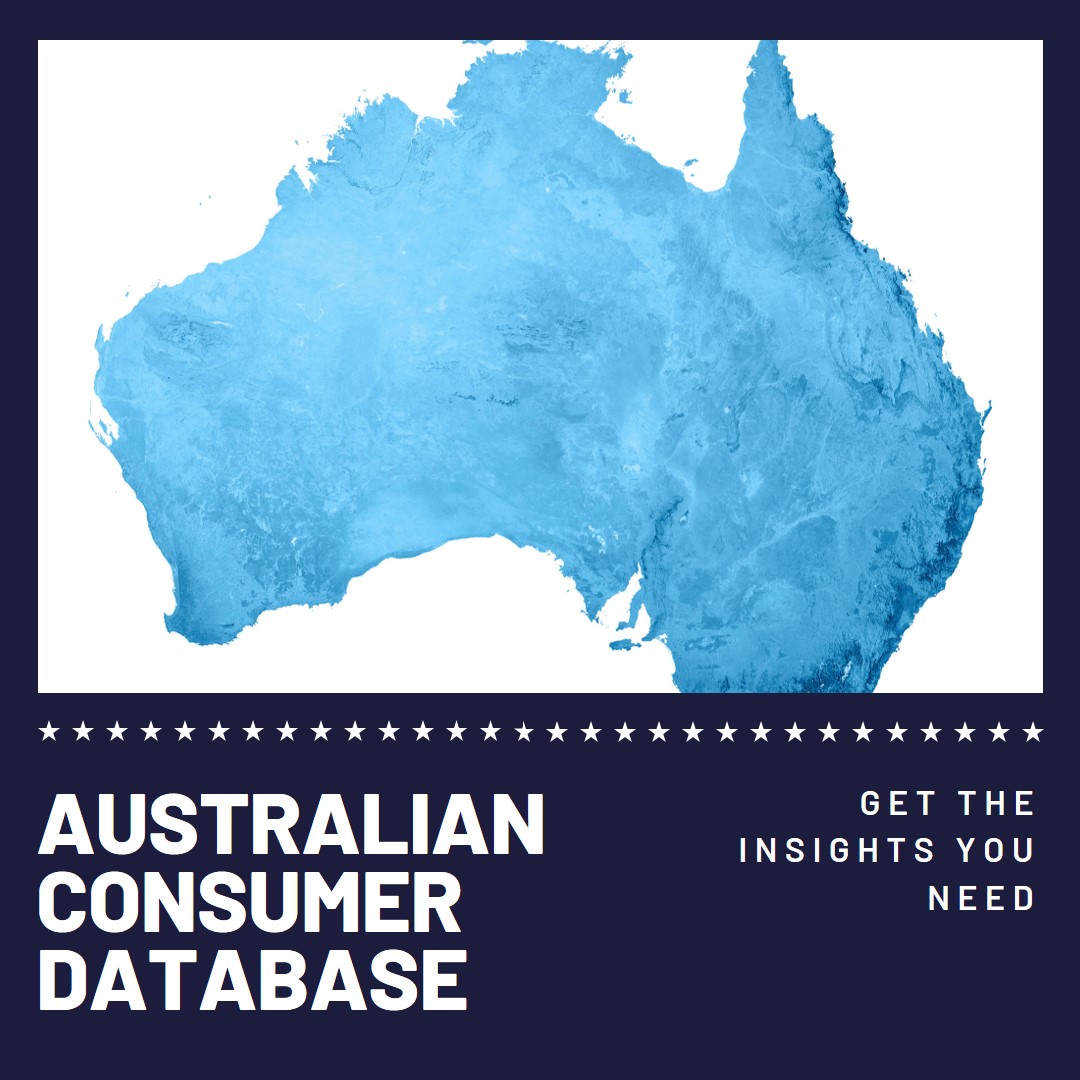Power of Australian Consumer Database: Insights, Targeting, and Growth
In today’s digital age, data is a precious commodity that holds the key to business success. Understanding your target audience, their preferences, and behavior is crucial for developing effective marketing strategies and driving business growth. This is where the Australian Consumer Database comes into play. The Australian Consumer Database is a comprehensive collection of consumer information that can help businesses gain valuable insights, target the right audience, and achieve higher conversion rates.
In this article, we will delve into the world of the Australian Consumer Database and explore its potential in revolutionizing your marketing efforts. From understanding the basics to harnessing the power of this resource, we will navigate through the intricacies of the database, uncovering its benefits and providing practical tips for success.
What is the Australian Consumer Database?
The Australian Consumer Database is a vast repository of consumer information that encompasses a wide range of demographics, preferences, and behavioral data. It is a treasure trove of valuable insights that can assist businesses in understanding their target audience more comprehensively.
The Key Elements of the Australian Consumer Database
The Australian Consumer Database consists of several key elements that collectively form a comprehensive view of consumers in Australia. These elements include:
Demographic Information
Demographic information forms the foundation of the Australian Consumer Database. It includes details such as age, gender, location, income level, and occupation. By analyzing this data, businesses can gain insights into the characteristics of their target audience and tailor their marketing strategies accordingly.
Psychographic Data
Psychographic data provides a deeper understanding of consumer preferences, interests, and values. It encompasses factors such as lifestyle choices, hobbies, purchasing behaviors, and brand affinities. This data enables businesses to create personalized and targeted marketing campaigns that resonate with their audience on a deeper level.
Purchase History
The purchase history component of the Australian Consumer Database tracks consumer buying patterns and behavior. It includes information about previous purchases, frequency of purchases, and average spend. By analyzing this data, businesses can identify cross-selling and upselling opportunities, improve customer retention, and optimize their product offerings.
Contact Information
Contact information, such as email addresses and phone numbers, allows businesses to establish direct communication channels with their target audience. It facilitates personalized marketing campaigns, customer engagement, and relationship-building efforts.

Benefits of the Australian Consumer Database
The Australian Consumer Database offers numerous benefits for businesses looking to enhance their marketing strategies and drive growth. Here are some key advantages:
Enhanced Targeting
With the vast amount of data available in the Australian Consumer Database, businesses can refine their target audience selection and focus their marketing efforts on those most likely to convert. This precision targeting leads to higher conversion rates, improved ROI, and reduced marketing spend.
Personalized Marketing Campaigns
Personalization is key in today’s marketing landscape. By leveraging the Australian Consumer Database, businesses can create tailored marketing campaigns that resonate with individual consumers. This personal touch enhances customer engagement, builds brand loyalty, and drives repeat business.
Improved Customer Insights
The Australian Consumer Database provides businesses with invaluable insights into their customers’ preferences, behaviors, and needs. By analyzing this data, businesses can gain a deeper understanding of their target audience and make informed decisions to better serve their customers.
Competitive Advantage
Utilizing the Australian Consumer Database gives businesses a competitive edge in the market. By having access to comprehensive consumer information, businesses can stay ahead of their competitors by understanding market trends, identifying untapped opportunities, and delivering more targeted and compelling marketing campaigns.
Increased ROI
When marketing efforts are directed towards the right audience, the return on investment (ROI) is significantly improved. By leveraging the Australian Consumer Database to refine targeting and personalize marketing campaigns, businesses can maximize their marketing budget and achieve higher conversion rates, resulting in a higher ROI.
Utilizing the Australian Consumer Database Effectively
To make the most of the Australian Consumer Database, businesses need to adopt effective strategies and best practices. Here are some tips to help you leverage the power of this resource:
Data Analysis and Segmentation
Analyzing the data within the Australian Consumer Database is crucial for identifying patterns, trends, and insights. Businesses should segment their audience based on relevant criteria, such as demographics, psychographics, and purchase history. This segmentation allows for targeted messaging and tailored marketing campaigns that are more likely to resonate with specific consumer segments.
Personalization and Customization
Personalization is a key driver of customer engagement and satisfaction. By using the Australian Consumer Database, businesses can create highly personalized marketing content, such as personalized emails, product recommendations, and targeted advertisements. Customization builds a sense of connection and relevance, leading to increased customer loyalty and higher conversion rates.
Testing and Optimization
Continuous testing and optimization are essential for maximizing the effectiveness of marketing campaigns. Businesses can use the Australian Consumer Database to conduct A/B testing, analyze performance metrics, and refine their strategies based on data-driven insights. This iterative approach ensures that marketing efforts are constantly improving and delivering the desired results.
Compliance with Privacy Regulations
While the Australian Consumer Database provides valuable consumer information, it is crucial for businesses to adhere to privacy regulations and data protection laws. Obtaining proper consent, securely storing data, and using it in compliance with relevant regulations are essential to maintain consumer trust and protect their privacy.
The Australian Consumer Database is a powerful tool that can revolutionize your marketing strategy, enhance customer engagement, and drive business growth. By leveraging the vast amount of consumer information it provides, businesses can gain valuable insights into their target audience, refine their targeting efforts, and deliver personalized and compelling marketing campaigns.
Remember, the key to success lies in effective data analysis, segmentation, personalization, and continuous optimization. By harnessing the power of the Australian Consumer Database, you can unlock new opportunities, outshine competitors, and build stronger connections with your customers.
Now is the time to tap into the potential of the Australian Consumer Database and take your marketing efforts to new heights.
FAQs (Frequently Asked Questions)
How can the Australian Consumer Database benefit my business?
The Australian Consumer Database offers several benefits for businesses. By utilizing this database, you can enhance your targeting efforts, personalize your marketing campaigns, gain valuable customer insights, gain a competitive advantage, and improve your return on investment (ROI). With access to comprehensive consumer information, you can refine your strategies, maximize customer engagement, and drive business growth.
Is the Australian Consumer Database legally compliant?
Yes, it is crucial for businesses to comply with privacy regulations and data protection laws when utilizing the Australian Consumer Database. Obtaining proper consent from consumers, securely storing data, and using it in compliance with relevant regulations is essential. By adhering to legal requirements, businesses can maintain consumer trust and protect their privacy.
How can I effectively analyze and segment the data within the Australian Consumer Database?
To effectively analyze and segment the data within the Australian Consumer Database, follow these steps:
Define your segmentation criteria: Determine the relevant factors for segmenting your audience, such as demographics, psychographics, purchase history, or location. Consider what information will help you create targeted marketing campaigns.
- Clean and organize the data: Ensure that the data within the database is accurate, up-to-date, and free from duplicates or errors. Cleanse the data to remove any irrelevant or incomplete information. Organize the data in a structured manner for easy analysis.
- Utilize data analysis tools: Employ data analysis tools or software that can handle large volumes of data and provide valuable insights. These tools can help you identify patterns, trends, and correlations within the database.
- Conduct exploratory analysis: Dive into the data and explore various segments based on the defined criteria. Look for patterns or characteristics that distinguish different groups within your target audience.
- Evaluate segment performance: Analyze the performance metrics of each segment, such as conversion rates, engagement levels, or customer lifetime value. Assess which segments are most profitable and offer the highest potential for growth.
- Refine your segments: Based on the insights gained from the analysis, refine your segments further to create more targeted groups. Consider combining or splitting segments to optimize your marketing efforts.
- Develop tailored marketing campaigns: With well-defined segments, create customized marketing campaigns that resonate with each group’s unique characteristics, preferences, and needs. Craft personalized messages, offers, and experiences to maximize engagement and conversions.
- Monitor and measure results: Continuously monitor the performance of your marketing campaigns and measure the results against predefined goals and metrics. Use the feedback to refine your strategies and improve future campaigns.
Remember, effective data analysis and segmentation require a combination of technical expertise and strategic thinking. By leveraging the Australian Consumer Database and applying these best practices, you can gain deeper insights into your audience and develop highly targeted marketing campaigns for optimal results.
How can the Australian Consumer Database help businesses expand their reach beyond Australia?
The Australian Consumer Database primarily focuses on consumer information within Australia. However, businesses can still leverage this resource to expand their reach beyond Australia in several ways:
- Geographical segmentation: Analyze the demographic data within the database to identify consumers who have an affinity for international products or services. This can help you target specific segments interested in expanding their purchase preferences globally.
- Psychographic targeting: Utilize psychographic data to identify consumers who exhibit behaviors and preferences aligned with international markets. For example, individuals with a strong interest in travel, cultural diversity, or global trends may be more open to exploring international offerings.
- Partnering with international businesses: Collaborate with international businesses that have access to consumer databases in their respective countries. By sharing data and insights, you can enhance your targeting efforts and reach a broader audience.
- Online advertising platforms: Leverage online advertising platforms that offer geo-targeting options. By using the Australian Consumer Database to understand your existing audience, you can create lookalike audiences in other countries with similar characteristics and preferences.
While the Australian Consumer Database primarily focuses on Australia, businesses can leverage its insights and combine them with other strategies to expand their reach internationally.
Can the Australian Consumer Database help small businesses compete with larger competitors?
Absolutely! The Australian Consumer Database can level the playing field for small businesses, enabling them to compete effectively with larger competitors. Here’s how:
- Enhanced targeting: The database allows small businesses to refine their target audience and identify niche markets that are more likely to convert. By focusing on specific segments and tailoring their marketing efforts, small businesses can effectively reach and engage their ideal customers.
- Brand differentiation: Small businesses can leverage the Australian Consumer Database to understand the preferences and interests of their target audience better. This knowledge can be used to develop a unique brand identity and positioning that sets them apart from larger competitors. By highlighting their distinct value proposition, small businesses can attract customers who resonate with their offerings.The Australian Consumer Database empowers small businesses to compete with larger competitors by enabling enhanced targeting, personalized customer experiences, agility in decision-making, and cost-effective marketing strategies. By leveraging the valuable consumer insights it provides, small businesses can carve out their niche, build strong customer relationships, and thrive in a competitive market.
MORE FAQs CONCERNING AUSTRALIAN CONSUMER DATABASE:
- How does the Australian Consumer Database benefit small businesses?The Australian Consumer Database benefits small businesses by enabling enhanced targeting, personalized customer experiences, agility in decision-making, and cost-effective marketing strategies.
- Can small businesses leverage the Australian Consumer Database to differentiate their brand?Yes, small businesses can leverage the consumer information in the database to understand their target audience better and develop a unique brand identity and positioning that sets them apart from competitors.
- How can small businesses provide personalized customer experiences using the Australian Consumer Database?Small businesses can use the consumer information in the database to tailor recommendations, offers, and customer service based on their customers’ preferences, purchase history, and behavior.
- How does the Australian Consumer Database help small businesses make agile decisions?With real-time consumer insights from the database, small businesses can make data-driven decisions and quickly adapt their marketing strategies, product offerings, or pricing to meet the changing needs and preferences of their target audience.
- Can the Australian Consumer Database help small businesses optimize their marketing budget?
Personalized customer experiences: Small businesses can use the consumer information in the database to create personalized customer experiences. By understanding their customers’ preferences, purchase history, and behavior, small businesses can provide tailored recommendations, exclusive offers, and exceptional customer service.
This personal touch builds customer loyalty and fosters positive word-of-mouth referrals.Agile decision-making: With access to real-time consumer insights, small businesses can make agile and data-driven decisions. They can quickly adapt their marketing strategies, product offerings, or pricing based on the changing needs and preferences of their target audience. This flexibility allows small businesses to stay ahead of the curve and respond effectively to market trends.
- Cost-effective marketing:The Australian Consumer Database helps small businesses optimize their marketing budget by targeting the right audience. Instead of investing in broad and generic advertising campaigns, they can focus their resources on reaching the most relevant prospects.This targeted approach maximizes the return on investment and ensures that marketing efforts are utilized efficiently.
Yes, the database allows small businesses to target the right audience more effectively, optimizing their marketing budget and ensuring that resources are utilized efficiently.
Can the Australian Consumer Database help businesses target specific regions within Australia?
Yes, the Australian Consumer Database can be a valuable resource for businesses looking to target specific regions within Australia. Here’s how it can help:
- Geographical data: The database contains information about consumers’ locations within Australia. By analyzing this data, businesses can identify the regions where their target audience is concentrated.
- Regional segmentation: Businesses can segment the Australian Consumer Database based on geographical factors such as states, cities, or postal codes. This segmentation allows businesses to create targeted marketing campaigns specific to each region.
- Localized messaging: With insights from the database, businesses can craft marketing messages that resonate with the unique characteristics, preferences, and needs of consumers in different regions. This localized approach helps businesses establish a stronger connection with their target audience.
- Regional trends and preferences: The Australian Consumer Database can provide valuable insights into regional trends and preferences. By understanding the specific demands and interests of consumers in different regions, businesses can tailor their products, services, and marketing strategies accordingly.
- Location-based promotions: Businesses can leverage the database to offer location-based promotions or incentives to consumers in specific regions. By personalizing their offerings based on geographic relevance, businesses can increase engagement and drive conversions.
By using the Australian Consumer Database to target specific regions within Australia, businesses can optimize their marketing efforts, improve customer engagement, and increase their chances of success in local markets.
How can businesses ensure data security when utilizing the Australian Consumer Database?
Data security is crucial when using the Australian Consumer Database to protect customer information and maintain consumer trust. Here are some best practices for ensuring data security:
- Secure data storage: Implement robust security measures to protect the data within the Australian Consumer Database. This includes encryption techniques, secure servers, access controls, and regular security audits to identify and address any vulnerabilities.
- Limited access: Limit access to the database to authorized personnel who require it for their specific roles. Implement strict user authentication protocols, strong passwords, and multi-factor authentication to prevent unauthorized access.
- Regular data backups: Regularly back up the data within the database to prevent data loss in the event of system failures or security breaches. Store the backups securely and test the restoration process to ensure their integrity.
- Employee training: Educate your employees about data security practices, including the importance of safeguarding customer information and recognizing potential security threats such as phishing emails or social engineering attempts.
- Data retention and disposal: Establish clear policies for data retention and disposal. Regularly review and remove outdated or unnecessary data from the database to minimize the risk of data breaches.
By following these data security best practices, businesses can ensure the protection of customer information when utilizing the Australian Consumer Database, maintaining consumer trust and mitigating potential risks.
Compliance with regulations: Familiarize yourself with the relevant privacy regulations and data protection laws in Australia. Ensure that your data collection, storage, and usage practices align with these regulations, such as obtaining proper consent from consumers.
Can the Australian Consumer Database help businesses in niche industries target their specific audience?
Yes, the Australian Consumer Database can be an invaluable tool for businesses in niche industries to target their specific audience. Here’s how it can be beneficial:
Niche consumer insights: The database provides comprehensive consumer information, allowing businesses to gain insights into the preferences, behaviors, and demographics of their niche audience. This knowledge helps businesses understand their target market better.
Targeted segmentation: With the Australian Consumer Database, businesses can segment their audience based on specific criteria relevant to their niche industry. This includes factors such as interests, hobbies, lifestyle choices, or specialized professional qualifications.
Customized messaging: Armed with the insights from the database, businesses cancraft customized messaging that speaks directly to the interests and needs of their niche audience. This tailored approach helps businesses resonate with their target market and establish a strong connection.
Competitive advantage: Utilizing the Australian Consumer Database gives businesses in niche industries a competitive advantage. By understanding their target audience better than their competitors, businesses can tailor their offerings, marketing efforts, and customer experiences to stand out in the market.
By leveraging the Australian Consumer Database, businesses in niche industries can gain valuable insights, target their specific audience, customize their messaging, refine their marketing strategies, and gain a competitive edge. It helps them connect with their niche market more effectively and increase their chances of success.
How frequently is the Australian Consumer Database updated?
The frequency of updates to the Australian Consumer Database can vary depending on the provider or source of the data. Ideally, the database should be updated regularly to ensure the accuracy and relevancy of the consumer information.
While there is no standard timeframe for updates, reputable providers strive to keep their databases as up-to-date as possible. They may source data from various channels such as surveys, opt-in forms, public records, and third-party data providers to maintain the freshness of the information.
However, it’s important to note that consumer information is subject to change due to various factors like relocation, changes in preferences, or updates in personal details. Therefore, businesses should consider the recency of the data and perform regular checks or updates to ensure the accuracy of the consumer information they utilize from the Australian Consumer Database.
Is the Australian Consumer Database compliant with privacy laws and regulations?
When using the Australian Consumer Database, it is essential to ensure compliance with privacy laws and regulations. Reputable providers of consumer databases take privacy seriously and adhere to relevant data protection laws in Australia.
They obtain consumer data through legal and ethical means, with proper consent and transparency. They also implement robust security measures to protect the data from unauthorized access or breaches. Additionally, they provide options for consumers to manage their data and exercise their rights regarding data privacy and consent.
However, it’s crucial for businesses to conduct due diligence when selecting a provider for the Australian Consumer Database. They should verify that the provider complies with privacy laws and regulations, has appropriate data handling policies in place, and maintains transparency in their data collection and usage practices.
By partnering with a compliant provider and implementing proper privacy protocols, businesses can utilize the Australian Consumer Database while upholding privacy standards and building trust with their customers.
These FAQs provide in-depth answers to common questions about the Australian Consumer Database, covering topics such as targeting specific regions, ensuring data security, niche audience targeting, database updates, and privacy compliance. By addressing these queries, businesses can gain a comprehensive understanding of how to leverage the Australian Consumer Database effectively to achieve their marketing and business objectives.
Precise targeting: The Australian Consumer Database allows businesses to target their niche audience with precision. By leveraging the database’s information, businesses can identify the specific individuals or groups who are most likely to be interested in their niche products or services.
Refine marketing strategies: With access to consumer data within their niche industry, businesses can refine their marketing strategies to effectively reach their target audience. They can identify the most effective channels, messaging tone, and marketing campaigns that resonate with their niche market.Measure campaign effectiveness:
The database enables businesses to track and measure the effectiveness of their marketing campaigns targeting the niche audience. By analyzing the data and monitoring key performance metrics, businesses can optimize their strategies and improve campaign results over time.



